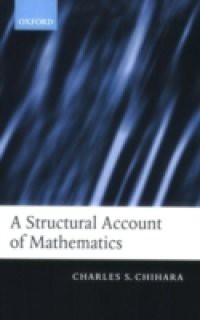Charles Chihara's new book develops and defends a structural view of the nature of mathematics, and uses it to explain a number of striking features of mathematics that have puzzled philosophers for centuries. The view is used to show that, in order to understand how mathematical systems are applied in science and everyday life, it is not necessary to assume that its theorems either presuppose mathematical objects or are even true. Chihara builds upon his previous work, in which he presented a new system of mathematics, the constructibility theory, which did not make reference to, or presuppose, mathematical objects. Now he develops the project further by analysing mathematical systems currently used by scientists to show how such systems are compatible with this nominalistic outlook. He advances several new ways of undermining the heavily discussed indispensability argument for the existence of mathematical objects madefamous by W. V. Quine and Hilary Putnam. And Chihara presents a rationale for the nominalistic outlook that is quite different from those generally put forward, which he maintains have led to serious misunderstandings. A Structural Account of Mathematics will be required reading for anyone working in this field.

